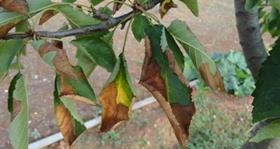
Bacterial plant disease Xylella fastidiosa has been found in Spain for the first time leading to a ban on movement of cherry trees within a 15,000 hectare area.
The disease was found on three cherry trees at a garden centre in Porto Cristo, on the island of Majorca. Three strains of the disease have now been located on hosts in Italy, southern France (including Corsica), Germany and Spain (Majorca), although it is yet to reach the UK.
Xylella has the potential to be a big threat to ornamental and fruit production, according to the Animal and Plant Health Agency (APHA).
It can be carried by hosts including trees, shrubs and herbaceous plants, including oak, rose and lavender, and is transmitted by insects such as leaf-hoppers.
The bacteria multiply within the xylem and obstruct the flow of water around the plant. In some cases, this causes the leaves to die off, which is a key symptom, but can also be confused with under-watering or autumnal leaf-drop making diagnosis challenging.
Plant importers must now ensure all host plants are accompanied by a passport confirming that they have been sourced from a disease free area.



